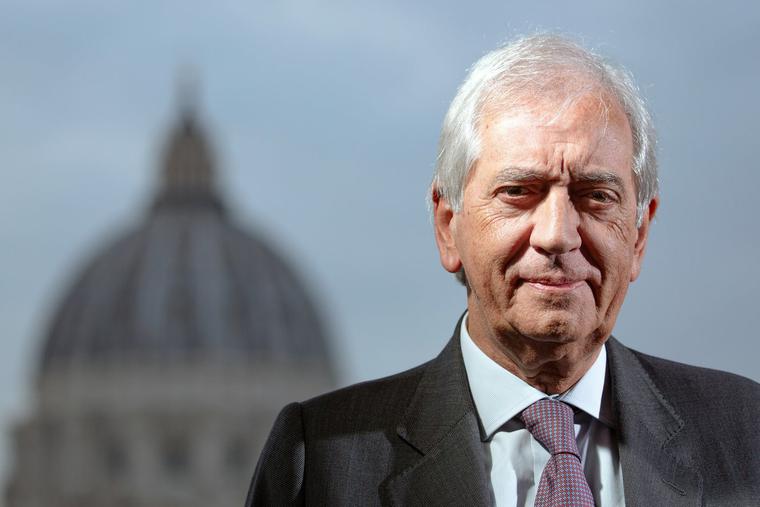The former auditor general says his 2017 ouster was unjust and part of a wider effort to block financial reform inside the Vatican.
Libero Milone, the Vatican’s ex-auditor general, doesn’t give up easily. Having had his lawsuit against the Vatican for unlawful dismissal rejected in 2024, fined 113,000 euros in trial costs, and his appeal rejected in July, he has now taken his case to the Court of Cassation, the supreme court of Vatican City State.
He has also written to Pope Leo XIV requesting a private audience, not only to explain his case but also to warn him of the reality of the Vatican’s financial situation which, he firmly believes, continues to be dire despite what the Vatican tries to convey.
As is now well known, Milone’s 9.3-million-euro lawsuit centers on allegations he and his late deputy, Ferruccio Panicco, were framed and forced to resign in 2017 after they uncovered corruption and financial irregularities at high levels within the Vatican.
In a press briefing on Tuesday, Milone was in a combative mood, laying out the entirety of his case in considerable detail and arguing that the Vatican’s behavior toward him has not only been clearly unjust but reprehensible.
Stressing that he and his team have always respected the law and presented the truth, he said the Vatican has “never once” addressed the substance of his claim, focusing instead only on procedural issues — “and they got that wrong, too,” he said.
The Vatican, for its part, has claimed he was spying and that it has “irrefutable evidence” against him, “but this was never produced,” Milone said. A Vatican document that apparently explains why he and Panicco were forced out has never been shown to them. The Vatican “did not understand, Milone was just auditing,” the Vatican’s ex-auditor said, quoting Cardinal Pell’s words on Italian television in 2021.
One of the Vatican’s main arguments for rejecting Milone’s lawsuit is that he directed his claim against the Secretariat of State. Instead, Vatican judges say he should have sued the individuals chiefly responsible for carrying out the 2017 raid on his offices that subsequently led to Milone’s and Panicco’s forced resignations — that is, Cardinal Angelo Becciu, at the time deputy Secretary of State, and Domenico Giani, then-commander of the Vatican police.
But Milone vehemently rejects this, saying it is inconceivable that the two men made the decision independently. It was an institutional decision, he argues, and Becciu “clearly acted using the powers inherent to his public office.” Milone and his lawyers also draw on a 1933 Italian law stipulating that any claim against the Vatican should be directed toward the Secretariat of State. Additionally, they have cited a 2019 Italian civil law, which also applies to the Vatican, stating that the entity employing the plaintiff is civilly liable for damages, not certain individuals within it.
Further actions of Vatican officials drastically undercut their own case against the auditor, he argues. Last year, judges ordered Milone and his legal team to remove 20 pages of their defense containing details of the activities his auditing had carried out if they wanted to receive a full hearing. Those pages were included to show they had carried out the required audit work. “They even required the exclusion of the presentation of witnesses,” Milone said, adding that their reasons were that they were “offensive for the top management.”
“There is no other way to describe this other than ridiculous,” Milone said with exasperation.
He argues that if evidence produced and debated in the courtroom is deemed inappropriate, then a judge can throw it out, but it needs to be heard first. “It is simply inconceivable that a plaintiff be ordered to remove evidence which supports his claim,” he protests.
And he considers it a scandal that the Vatican should behave in this way. It should be a “role model, not a protection system,” he said. “A court cannot protect its own top management.” To him and his defense team, the Vatican appears “not to wish the truth to be recognized.”
Recalling how both he and Cardinal Pell were forced out of the Vatican at around the same time, he describes the situation as an “Orwellian system of protection of power within the Vatican.”
Milone said he wishes not only to have his good reputation restored, but to return to the Vatican to finish the job, stressing that this is the only assignment he has never completed in his long and distinguished career. He also sees it as his ethical duty, having accepted the role of the Vatican’s first auditor general, to ensure the expectations of the Catholic faithful are fulfilled.
Unless his case is resolved, he is also concerned that Pope Leo won’t be able to attract a new and independent auditor general “with teeth,” as a competent individual won’t wish to compromise his personal reputation and jeopardize his career in such a hostile and unjust environment.
Whatever the decision of the Vatican’s supreme court, Milone will battle on. “I am a firm believer that a justice system has to be respected, even when it might appear to derail,” he said. “Therefore, it is essential to go through a complete process.”
